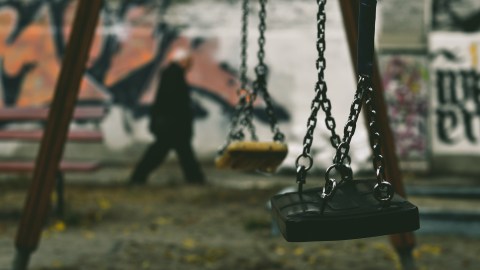How socioeconomic status negatively impacts children’s brains

Credit: alexfan32 / Shutterstock
- Children in poor neighborhoods exhibit abnormal activation of motivational circuits in their brains.
- The neurological impact increases the likelihood of criminal behavior and substance abuse later in life.
- Researchers suggest focusing on shaping the environment to set up the child for success.
A 1973 experiment produced interesting data about noise and education—and, by extension, socioeconomic status. The Bridge apartment complex sits directly over Interstate 95 in Manhattan. Researchers noticed the echo chamber effect generated by highway noise negatively impacted children’s ability to read. Children living on lower floors experienced serious problems due to their inability to concentrate. On higher floors, which were both more expensive and subject to less ambient noise, children didn’t have the same difficulties.
The longstanding myth that every American has the same opportunities needs to be abandoned. Black, LatinX, and Native American communities are being disproportionately affected by COVID-19. Residents of economically disadvantaged neighborhoods have less access to health care and public services. This is true of anyone in these economic categories, but these categories tend to include the aforementioned communities.
A new study, published in the journal Psychological Science, adds to the growing literature of socioeconomic trauma. Researchers from The University of Mexico found that children in poor neighborhoods exhibit abnormal activation of motivational circuits in their brain, putting them at greater risk for mental health and social problems.
The focus of this study was the brain’s reward system. A link between reward and motivation is well established. For example, getting into flow states requires immediate feedback and achievable tasks. The reward—a psychological state in which time dissolves—results with regular training. The takeaway: an achievable reward awaits your effort.
Rewards are thin or nonexistent for children in disadvantaged neighborhoods. Forget flow; mere survival is in question. The team scanned the brains of 6,396 children (ages 9-10) while they completed an anticipation task that required them to either quickly win or refrain from losing a reward.
How America’s public schools keep kids in poverty | Kandice Sumnerwww.youtube.com
The results show that children from poorer zip codes (household income of less than $35,000 or in the $35,000-$50,000 range) suffered greater internalizing and externalizing psychological problems than children from wealthier (six-figure) neighborhoods. The internalizing-problems domain includes anxious-depressed symptoms, withdrawn-depressed symptoms, and somatic complaints (such as stomachaches), while the externalizing-problems domain includes attentional difficulties, aggression, and rule-breaking behaviors.
The team discovered decreased activation of the ventral and dorsal striatum, as well as the pallidum—motivational circuitry. Disadvantaged children were unable to anticipate rewards in the same manner as children from wealthier neighborhoods, and therefore unlikely to put in the same effort.
The team writes that this data suggest an increased likelihood of attention-deficit/hyperactivity disorder, along with impaired reward-motivated behavior—factors that increase the likelihood of criminal behavior and substance abuse later in life.
In sum, the team suggests changing the environment, not seeking out self-help coaches.
“This suggests that interventions to reduce externalizing in children from deprived neighborhoods would do well to focus on shaping the environment to set up the child for success, rather than providing, for example, verbal instruction to change goal-directed behavior.”
Mental health is rarely an individual matter. Your environment plays a far greater role in health than your genes. We’ve long denied this reality as a culture, pretending the “bootstraps” mentality applies equally to everyone. Decades of data show that to be false. Until we provide environments that allow all children an opportunity to thrive, studies like this will continue to highlight the dangers of economic and racial inequality on public health.
—
Stay in touch with Derek on Twitter, Facebook and Substack. His next book is “Hero’s Dose: The Case For Psychedelics in Ritual and Therapy.”





